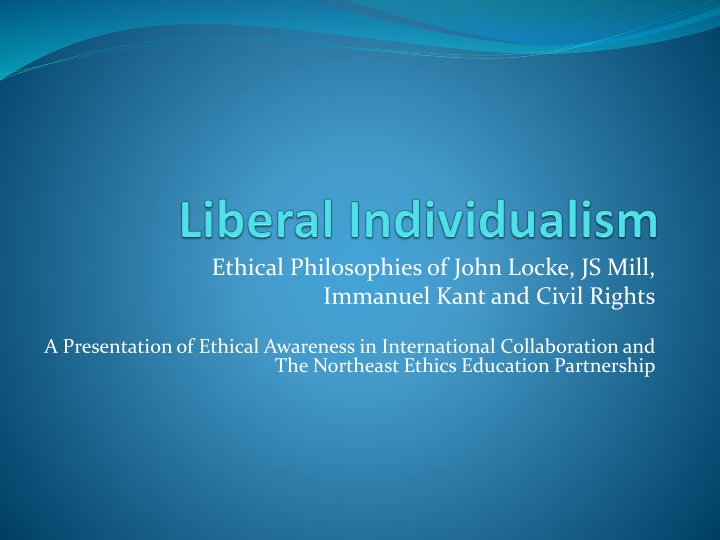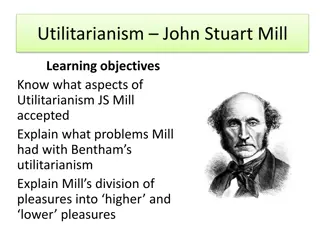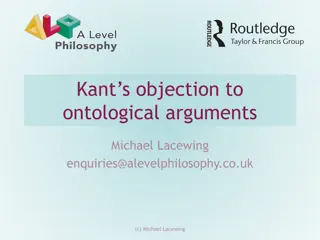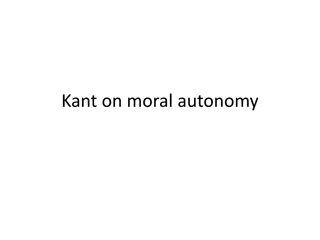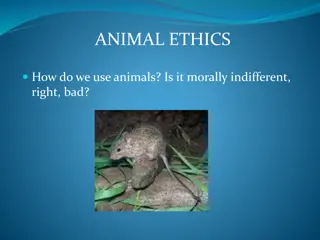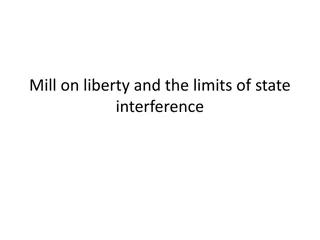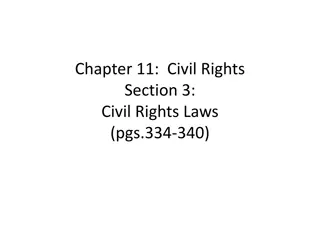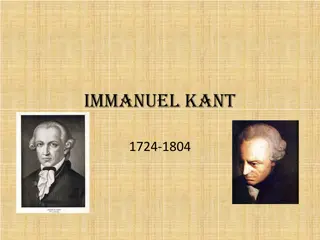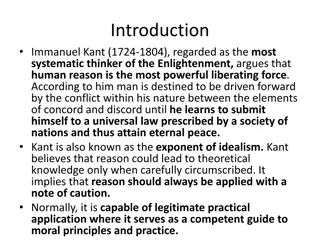Ethical Philosophies of John Locke, JS Mill, Immanuel Kant, and Civil Rights
This presentation explores the ethical philosophies of John Locke, JS Mill, and Immanuel Kant, focusing on individual rights, moral autonomy, and the principles of classical liberalism. It discusses the influence of these philosophers on research ethics, emphasizing the protection of individual human rights and liberties.
Download Presentation

Please find below an Image/Link to download the presentation.
The content on the website is provided AS IS for your information and personal use only. It may not be sold, licensed, or shared on other websites without obtaining consent from the author.If you encounter any issues during the download, it is possible that the publisher has removed the file from their server.
You are allowed to download the files provided on this website for personal or commercial use, subject to the condition that they are used lawfully. All files are the property of their respective owners.
The content on the website is provided AS IS for your information and personal use only. It may not be sold, licensed, or shared on other websites without obtaining consent from the author.
E N D
Presentation Transcript
Ethical Philosophies of John Locke, JS Mill, Immanuel Kant and Civil Rights A Presentation of Ethical Awareness in International Collaboration and The Northeast Ethics Education Partnership
Classical Liberalism In the middle of the 19thcentury, a new vision guided the organizing of societies by Western Europe and United States. Political ideology of classical liberalism sought to protect the liberty of individual citizens; the freedom of speech, religion, assembly, and press were core commitments in the classical liberalism tradition.
Classical Liberalism There was a primacy on the freedom of the individual, and individual choice which distinguished this philosophy from socialism or communism. The proper role of a just government was instrumental in the protection of the liberties of individual citizens. Another major commitment was the role of free markets, as the best way to organize economic life.
Political parties were formed on both sides of the Atlantic to promote the principles of classical liberalism: individual liberties and protections as well as free markets (Democrats and Republicans). Classical liberals will promote equality before the law but not material equality. They are hostile to group rights and social rights.
Major liberalist philosophers, John Locke, JS Mill and Immanuel Kant, exert a strong influence on research ethics, - writing on individual rights, individual choice and individual moral autonomy.
John Locke (1632-1704) Locke was primarily concerned with the protection of individual human rights. Man being born... with a title to perfect freedom, and uncontrolled enjoyment of all the rights and privileges of the law of nature, equally with any other man, or number of men in the world, hath by nature a power, not only to preserve his property, that is , his life, liberty, and estate, against the injuries and attempts of other men, but also to punish the breaches of that law in others....[1] Photo by victorianweb.org
Locke defines individual rights as claims that protect the liberty and property of individuals in a society. With these rights are the purpose of entering a society that will make one people, one body politic, under one supreme government. Individuals can authorize the society to make rules for the public good. In the Two Treatises of Government, Locke was concerned with the role of the individual within a community and society.
For whenever any number of men, have, by the consent of every individual, made a community, they have thereby made that community one body, with a power to act as one body, which is only by the will and determination of the majority..... and so everyone is bound by that consent to be concluded by the majority.[2] Photo by raze.com [1] Salvadori, Massimo.1959. Locke and Liberty. London:Pall Mall Press: 166 (2) Ibid
Individual Rights for Property Locke focused on the need of society or a community to protect the property of its individuals. An individual can be a lord of his/her own person but be subjected to every danger and fear. Individuals can be willing to join a society with others, who are already united, for the mutual preservation of their lives, liberties and estates, which Locke calls by the general name, property.[3] [3]Ibid: 171
Protection of Property The highest purpose of unity for Locke was the preservation of this general term, property. No one should harm another in one s life, which includes health, liberty, or possessions. Persons had a God-given right to their body, the land he/she owned, the fruits of that labor and his/her money [4]. Photo by lifesip.com [4](Dean and Levi, p.53).
Locke also emphasized the need for majority-based consent; believing that consensus was impossible. Each person who submits to the society also must submit to majority rule as the power of the whole. Photo by malaysiainfocus.com
John Stuart Mill (1806-1873): Individual Liberty John Stuart Mill (1806-1873), the British classic individualist who wrote the treatise, On Liberty, to deal with combating the tyrannies of majorities over individual independence and personality. Photo by utilitarian.net
Protection against government tyranny is not enough, there needs to be protection against prevailing opinions; the means a society has, beyond civil penalties, to impose its own ideas and practices as rules of conduct on those who would dissent from them[5]. [5] Mill, John Stuart, 2004. On Liberty, New York: Hurst and Company: 13
Mill believed that a society should allow persons to develop according to their convictions as long as they do not interfere with the freedom of others. As members of a free society, we would actively strengthening the autonomy of others and not suppress individual freedom of expression [6]. [6] Beauchamp, T. and J. Childress. 2001. Principles of Biomedical Ethics, U.K.: Oxford University Press : 64
Mill argued that human beings should not mold their individuality to a group conformity, but instead should cultivate their individual identity, and call it forth, with the rights and interests of others, so that human life would be more rich, diversified and animating. Each person must be allowed to live a different life and not held to rigid rules of justice for the sake of others.
Mill was reacting in his time to what he perceived was a hostile and dreaded censorship from the highest class of society to the lowest. Too many individuals were conforming to a prevailing consciousness about an acceptable social position and station in society. Mill warned that they liked crowds too much. Their choices were limited by what others were doing and so they preferred convention; refusing eccentricity or peculiarities of taste.
Mill feared an homogenization that he saw spreading in Europe. An increase of commerce and manufacturing was creating a powerful agency over public opinion. Diversity and individuality became threatened. Photo by gordon.wiki.ccsd.edu
John Stuart Mill also saw a grave danger in the legislation of social rights upon citizen individual choices. Such legislation included social laws that prohibited the sale of alcohol or other products and Sabbatarian legislation. Mill reacted that these acts that would threaten individual rights and bring an invasion into each other s moral, intellectual and physical perfection where one is judged harshly by other s standards.
Mill supported these important maxims of individual liberty: (1) that the individual is not accountable to society for his/her actions, in so far as these concern the interests of no person but him/herself. We can only use advice, instruction, persuasion, and avoidance by other people should society justifiably express its dislike or disapprobation of one s conduct. Photo by taprootfoundation.org
(2) that for such actions as are prejudicial to the interests of others, the individual is accountable and may be subjected to either to social or legal punishment, if society is of opinion that the one or the other is requisite for its protection[7]. [7] Ibid: Mill, JS: 157
Immanuel Kant (1724-1804) The thought of Immanuel Kant, a noted German philosopher, is also foundational to liberal- individualism and to research ethics protections. Kant upholds the principle of individual autonomy, which the exercise of each individual s free will, not determined by sensual causes or by the will of others. Nature gave to each person, individual reason, the freedom of will based on that reason, for individuals to develop their own natural capacities, their own individual ends.
Rational Self-Esteem and Free Will Nature would seem to have each individual work his/her way from barbarism to the highest degree of skill and inner perfection (to happiness) through his/her own efforts. Nature has a view to building each individual s rational self-esteem more than his/her well-being. Each person has a will. The will alone can make moral choices. To will is to decide on action. Moral decisions are possible only if the will is free to act.
Worlds of Reason and Sense Each person is a noumenal being who is free as he/she is also a phenomenal being subject to the laws of nature and the laws of societies. Reason is the power of Ideas, it produces concepts of the unconditioned world, these go beyond what we can sense, reason has pure spontaneity which is entirely independent of sense. Each individual belongs to an intelligible world based the laws of reason, and a sensible world, based on the laws of nature and societies.
Good Will In the development of the individual morality, Kant described the concept of the good will as the supreme principle of morality. Photo by class.uidaho.edu
Within the good will is the indispensable condition for our worthiness to be happy. The good will is good solely through its willing alone. The good will is good through its fitness for attaining some proposed end not from what it effects or accomplishes but through its willing alone. It is good in itself[8]. [8] Kant, Immanuel, 1996. The Metaphysics of Morals. UK: Cambridge University Press: 62
Moral Reason Kant sees the function of reason to be that of producing a will that is good; not as a means to an end, a sole or complete good, but the highest good for the condition of all the rest of our goods even our demands for happiness [9]. [9] Ibid: 62
Kants Concept of Moral Duty The concept of duty functions for the good will and for our moral reasoning. Duty will bring out the good will and make it shine forth more brightly. The motive for duty has moral worth when self- interest is not involved in our acts of duty.
Happiness as Moral Duty To ensure one s happiness is a duty. Its moral worth again must be determined separately from the inclination toward ensuring happiness. A person will ensure their happiness when they have no inclination of wanting to, this person will do it out of duty that is where the moral worth is [10]. [10] Kant, Immanuel, 1956. The Groundwork of the Metaphysics of Morals. Translated by HJ Patton. New York: Harper Torchbooks: 64
Moral Worth Unconditioned Good Thus the moral worth of an action does not depend on the result expected from it, and so too does not depend on any principle of action that needs to borrow its motive from this expected result.
For all these results (agreeable states and even the promotion of happiness in others) could have been brought about by other causes as well, and consequently their production did not require the will of a rational being, in which, however, the highest and unconditioned good can alone be found.
Therefore nothing but the idea of the law in itself, which admittedly is present only in a rational being so far as it is, and not an expected result, is the ground determining the will can constitute the pre-eminent good which we call moral... [11]. [4] Ibid: 69
Universal Laws and Principles Kant would propose that if we rob the will of any inducement to act that might give it a consequence for obeying any particular law; nothing is left but the conformity of actions to a universal law. This universal law is the major principle of conduct that serves the will.
The Categorical Imperative I ought never to act except in such a way that I can will that my maxim become a universal law. [5] The categorical imperative is a canon of the acceptability of moral rules, a criterion for judging the maxims that direct and influence our actions. [5] Ibid: 70
Hypothetical Imperative A categorical imperative differs from a hypothetical imperative because the categorical imperative involves the renunciation of interest. As the will is itself a supreme lawgiver, it cannot be bound to a law that contains interest nor can it depend on any interest. A will which enacts universal law has no interest and is unconditioned.
Moral Autonomy To act on one s interest or another s interest in moral decision-making is to act with heteronomy. This is distinguished by Kant from the principle of autonomy. Autonomy of the will is the property the will has of being a law to itself. Heteronomy involves interest and influence. Morality becomes based on sensuous motives or sensibilities. Photo by erlc.com
Kant warns that we will attempt to claim moral motives in calculations of advancing our interests, promoting more vice than virtue. Also in a hypothetical imperative, one will not know beforehand what it will contain until its condition is given. In the categorical imperative, a need for conformity or conditions is not necessary; it is unconditional.[6] [6] Ibid: 88
Respect for Persons as Ends Another principle of Kant s categorical imperative is . [7] [7] Ibid: 96 Photo by urbanministry.org
Supreme Moral Reasoning Persons are not subjective ends whose existence as an object of our actions has a value for us they are objective ends existences as themselves. These are ends in themselves. If value was contingent or conditioned on forms of self-interest, we will not know absolute value. We could not realize any supreme principle from reason.[8] [8] Ibid: 96
The Kingdom of Ends Rational beings are all subject to the law that each of them should treat him/herself and all others, never as a means, but as an ends. By so doing, a systematic union of rational beings arises under common objective laws, a kingdom; each treating each other as ends; and so, the kingdom of ends. (9) [9] Ibid: 120
Morality of the Autonomous Will Each rational being is a member of the kingdom as he/she is subject to these laws. He/she is a head of the kingdom when he/she makes these laws and is subject to the will of no other. The making of laws must be found by every rational being within him/herself and must be able to spring from his/her will. Ibid: Groundwork
Equal Rights: African-Americans After the advocates and White Abolitionists asserted the universal Civil War (1880s -) African-American equality of man, universal liberty and universal human rights not just for descendents of British subjects. They promoted natural rights of freedom, respect for the substance of all human persons human rights based on lived human nature. Photo by cdn.dipity.com
Equal Rights African- Americans demanded equal-footing with all other citizens. This consisted of: Equal Ability show oneself equal, merit and achievement Equal Opportunity to be free from unnatural burdens and impediments and adverse legislation that hampers Black citizens; To counter state and local actions (white prejudices, slavery and white degradations upon Blacks)
Equal Rights Equality before the Law - this sought to eliminate laws that favored the interests of whites. Blacks should stand equal in the eyes of the law. Photo by blackpast.org
Civil Rights Amendment Title I Barred unequal application of voter registration requirements. "It shall be the duty of the judge designated pursuant to this section to assign the case for hearing at the earliest practicable date and to cause the case to be in every way expedited."'
Title II. Outlawed discrimination in hotels, motels, restaurants, theaters, and all other public accommodations engaged in interstate commerce; exempted private clubs without defining the term "private. Title III Prohibited state and municipal governments from denying access to public facilities on grounds of race, religion, gender or ethnicity. Title IV Encouraged the desegregation of public schools and authorized the U.S. Attorney General to file suits to enforce said act. Photo by digital.library.okstate.edu
Title V Expanded the Civil Rights Commission established by the earlier Civil Rights Act of 1957 with additional powers, rules and procedures. Title VI Prevented discrimination by government agencies that receive federal funding. If an agency is found in violation of Title VI, that agency can lose its federal funding.
General This title declares it to be the policy of the United States that discrimination on the ground of race, color, or national origin shall not occur in connection with programs and activities receiving Federal financial assistance and authorizes and directs the appropriate Federal departments and agencies to take action to carry out this policy. . Photo by oralhistoryeducation.com
Section 601 This section states the general principle that no person in the United States shall be excluded from participation in or otherwise discriminated against on the ground of race, color, or national origin under any program or activity receiving Federal financial assistance
